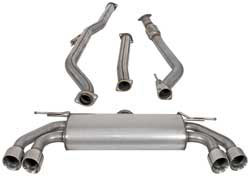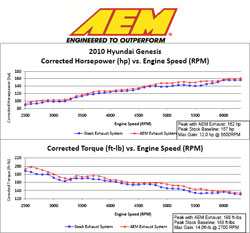Add 12 Horsepower to 2.0L Hyundai Genesis Coupe with AEM Performance Exhaust System
- Jan 25, 2011
At the close of 2010, AEM had successfully released two components that greatly enhanced the four-cylinder Genesis Coupe's performance. AEM's 21-687C Cold Air Intake for the 2.0L Coupe was the first component to be released to the aftermarket community by AEM and it offered an estimated increase of seven horsepower, which is substantial. Following the availability of the Cold Air Intake system, AEM introduced a comprehensive bolt-in charge air intercooler system (part number: 26-2100C), which afforded a significant reduction in post intercooler air temperature for the turbocharged coupe. To further embrace the "total tuning" concept, AEM now announces the release of its Turbo-Back Exhaust System for the 2010, 2011 and 2012 Hyundai Genesis Coupe with the turbocharged 2.0-liter four-cylinder engine (part number: 600-0600). AEM's all-new exhaust systems aim to provide an increase in performance and power along with a sporty sound while maintaining OEM standards in fit and finish. For the 600-0600 exhaust system, AEM began construction by gathering high-quality components. Three-inch diameter 304 stainless steel mandrel-bent tubing was used throughout the system. Additionally, every connection utilizes OEM-quality 3/8-inch thick stainless steel flanges and O-rings. Even the four exhaust tips of the 600-0600 exhaust system are brushed stainless steel. As for the actual layout of the system, AEM opted to retain the OEM routing paths in order to maintain OEM clearances to all critical systems. In doing so, AEM chose to begin the exhaust system at the turbo manifold. From the turbo manifold, the 600-0600 system includes a mandrel-bent downpipe with an integrated braided-steel section to ensure that any vibrations in the system are isolated from the chassis. Between the included downpipe and mid-pipe, the factory catalytic converter is retained. Following the mid-pipe to the rear of the vehicle, a single center-entry 304 stainless steel muffler was selected to vent the spent exhaust gases. Exiting the muffler are four OEM-quality brushed stainless steel exhaust tips. On the dyno, the Genesis Coupe's 600-0600 Exhaust System proved to enhance horsepower and torque output of the 2.0-liter turbocharged engine. The 600-0600 exhaust system showed an estimated maximum gain of 12 horsepower at 5,600 RPM. Estimated peak horsepower was also improved from the stock baseline of 157 horsepower to 162 horsepower at the wheels with the exhaust system installed. Estimated torque output gained 14 ft/lb at 2,700 RPM with the exhaust in place. While these dyno numbers reflect the performance gains of the exhaust system alone, even more power can be gained with the addition of AEM's Cold Air Intake System (21-687C) and Intercooler Kit (26-2100) as AEM has designed the 600-0600 Exhaust System to specifically complement those performance components. To find all AEM products for your vehicle, use the AEM Application Search feature then use the Where to Buy feature on AEMIntakes.com to find an AEM dealer near you. |
||








